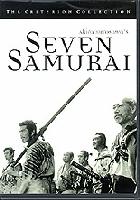|
The Seven Samurai (Criterion)
Starring Toshiro Mifune and Shimura Takahashi Directed by Akira Kurosawa Theatrical Release: 1954 Although there is little that anyone can say about The Seven Samurai that has not already been said, its recent release on DVD warrants another look at this remarkable film. It is a true classic that stands amongst the very best films ever made, and its director, the late Akira Kurosawa, is one of the most influential creators in film history. The picture is often grainy and dark, the sound is mono, and there are over three hours of subtitles to read (assuming, of course, that you don’t understand Japanese). However, it is the interwoven themes of courage, honor, politics, and life that blend seamlessly together to make this film as relevant and compelling today as it was nearly 45 years ago. In The Seven Samurai, farmers who are being threatened by bandits hire a band of seven samurai to defend their village. Because the farmers are so poor, they can only repay the samurai by providing them with meals. The band of samurai, led by a wise man played by Shimura Takashi, devise a plan to defend the village against nearly 40 bandits. Among them are a boy determined to become Takahashi’s disciple and a wild and careless fighter named Kikuchiyo, played by Toshiro Mifune. Kurosawa's use of images in this film is masterful. The funeral scene in which a single sword marks the grave of one of the samurai as dust blows across a hillside is striking. In the subsequent scene, the villagers realize that they must rally around the remaining samurai when they see a flag symbolizing their mutual dependence made by the fallen samurai. Although all of the actors give fine performances, it is Shimura Takahashi who quietly holds the film together with his character's stoicism and wisdom. In an especially poignant moment, Takahashi's character explains to the boy that the dream of becoming a great samurai often leads to the realization that much time has passed and that parents and friends have long since gone. This realization is reflected in the faces of the others as they each contemplate what they have sacrificed to become samurai. Mifune's portrayal of the seemingly carefree but inwardly anguished Kikuchiyo is also noteworthy. Although Kikuchiyo is undisciplined and reckless, he battles with a passion and the conviction of a man with a tortured soul. The picture quality of The Seven Samurai is fair at best and sometimes poor. Even with the restoration of the film, some scenes appear dark and grainy. The enhanced picture has good contrast, but with a resultant graininess as if the sharpness control of your television has been set too high. Although distracting, it is preferable to an overly soft picture with low contrast. The sound is mono and undistinguished. Dialogue is mostly intelligible (again if you understand Japanese, which I do -- a little). Foley effects and music are used sparingly, but the quality is acceptable and they serve to enhance the drama of the film. One of the extras included with this DVD is a rather strange demonstration of the picture restoration of the film. It consists of text screens explaining how various damage to the film was corrected and then showing repeated before and after examples. However, it is sometimes difficult to tell exactly what has been corrected as some scenes are played and replayed without explanation. The audio commentary provided by film historian Michael Jeck is more useful and informative. A theatrical trailer is also included. Criticizing The Seven Samurai for shortcomings in picture and sound quality is somewhat absurd considering its age and historical significance. That being said, some will find these shortcomings distracting and its length of over three hours daunting. Ultimately this film is about Kurosawa's brilliant vision of a complicated and sometimes indifferent world that make these complaints about technical flaws irrelevant. Anyone who considers film to be a legitimate form of artistic expression should see this film. GO TO |
||||||||
| Copyright
1998 SoundStage! All Rights Reserved |
![[SOUNDSTAGE!]](../../titles/sslogo3.gif) |
![[HIGHLY RECOMMENDED]](../pics/an_thumbup.gif)
 November
1998
November
1998